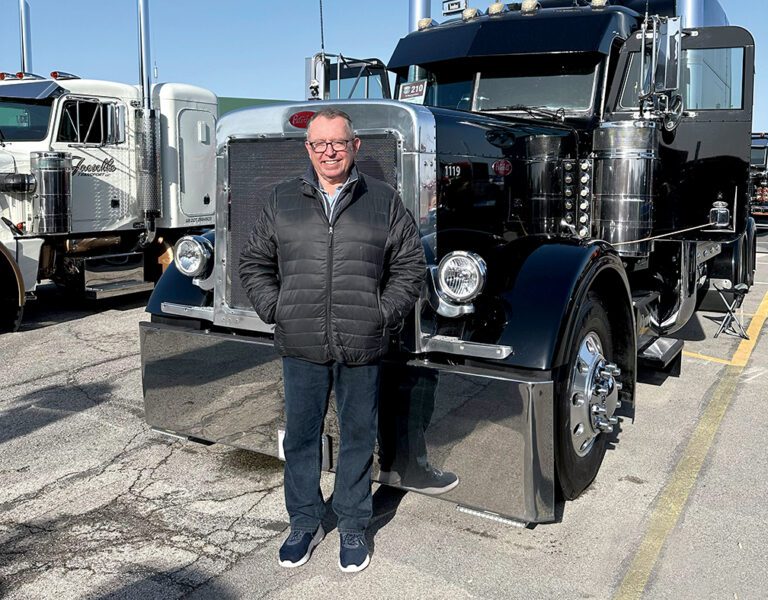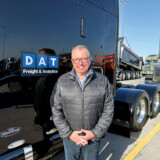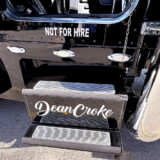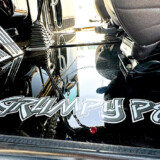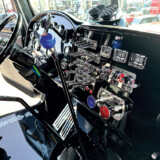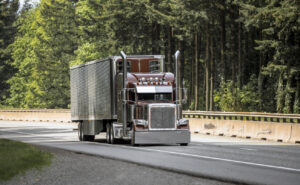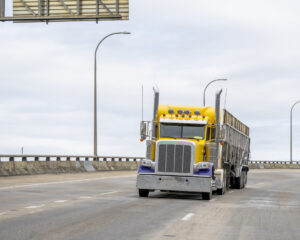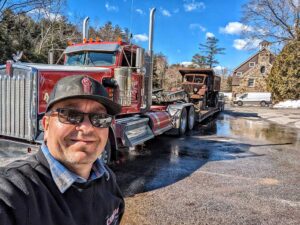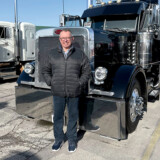
Some professional drivers are content with racking up awards for miles and years spent safely behind the wheel in their chosen segment of the trucking industry. Others enjoy the challenge of learning to operate different types of equipment and hauling more complicated cargo that requires mastering new processes. Still others move from behind the wheel into training and management, helping other drivers find success in their chosen career paths.
And then there’s Dean Croke, a farm boy turned professional athlete turned master driver … who today analyzes freight industry data and assists some of the largest carriers in existence.
It’s quite a story. Like any road trip, we’ll start at the beginning.
“I was born into a trucking business in Australia, in sort of the Outback area,” Croke explained. “When you grow up on a farm, you work as soon as you can sort of stand and walk. So, my first driving experience was at age 5 with my dad. He’d be up on the back (of the truck) stacking hay and I’d be driving around.”
By the time he was 10, Croke was taking a turn at the wheel while his father snatched a few minutes of rest.
The family trucking business was in Crookwell, in New South Wales, Australia, about two and a half hours from Sydney. The town is famous for seed potatoes, but the Croke trucking business was focused on something else — livestock.
“I’d have to wash out the cattle trailers after school,” Croke remarked. “I’m still quite accustomed to the smell of cow manure and diesel.”
Crookwell is famous for producing athletes, too, including a number of Olympians. Croke followed in his father’s athletic shoes, playing rugby on a professional level. A back injury led to therapeutic swimming, which evolved into triathlon competitions and half-Iron Man contests. Watching professional rugby matches is still one of Croke’s favorite leisure activities.
Croke’s trucking career could have come to an abrupt halt when his parents sold their business and moved the family to Australia’s capital city of Canberra to take advantage of the education opportunities available for Dean and his brother.
“Of course, since we got educations, we went straight back to truck driving, my brother and I,” he said with a laugh. “We couldn’t get away from it. At least we were a bit smarter for the exam.”
Croke accumulated more than 2 million miles, driving everything from straight trucks to gigantic four-trailer, 88-wheel road trains through Australia’s famous Outback.
“Your freight task is enormous because … 80% of the population lives on 3% of the land mass,” he explained. “Hauls of 1,500 miles are not out of the question. You’re on your own a lot, and in very inhospitable country — hot and dry. You’ve got to be more than a driver. You’ve got to be able to fix whatever breaks because there’s no 1-800 number.”
Those grueling trips, especially on dirt roads, are hard on equipment.
“If you’re doing a lot of off-road work in the dirt hauling cattle, you’ll change four tires a day,” he said. “You see a lot of road trains have four tires under each trailer and belly tanks of diesel for refueling when you’re in remote areas.”
The tough road conditions call for cooperation between drivers.
“You never go past anyone that’s broken down; that’s like a golden rule,” Croke said. That goes for four-wheelers, too. “It’s not uncommon for tourists to be broken down and then to be towed into the nearest town at the back of four trailers,” he said. “Cars get into trouble; they overheat and there’s no AAA down the road. You could be 1.000 miles from anywhere.”
On the highway, vehicle length restrictions require fewer trailers and cabover tractors for most applications but operators in the Outback are allowed longer hoods and larger sleepers. A 100 kilometer-per-hour speed limit (62 mph) is strictly enforced using gantry camera systems that calculate speeds and alert law enforcement.
In 1997, Croke was managing a trucking company when he was faced with the heartbreaking task of notifying the families of two drivers that their loved ones had died after falling asleep at the wheel. That experience shaped his choices for the future of his career.
As the industry evolved, the country added more regulation and law enforcement, fundamentally changing the industry. Croke got involved with the Australian Trucking Association, helping develop the organization’s “TruckSafe” industry accreditation program. A feature of the program is that accreditation earns a carrier an exemption from some regulatory requirements, such as annual truck inspections.
Dean’s move to the U.S. began when he gave a presentation on sleep deprivation for drivers in his home country. A professor from Harvard happened to be in the audience. Impressed with Croke, the professor offered the Australian an opportunity to manage a safety consulting business in Massachusetts. With Croke’s help, Circadian Technologies developed predictive models, based on driver log entries, that help identify drivers with a higher risk of fatigue-related accident.
“So, that’s sort of how I got here, and what got me down the path of data analytics and data science,” Croke said. He has presented close to 700 classes on the science of sleep, teaching drivers how to get better quality rest.
Nowadays he’s added to his resume duties as the principal freight analyst for DAT Freight & Analytics. Using data derived from postings to the DAT load board and other resources, Croke counsels trucking industry decision makers about market trends, helping them manage their businesses under sometimes turbulent conditions. He’s a frequent speaker at industry events, making presentations on freight trends, safety processes and sleep science.
Croke also publishes video blogs for DAT and others, offering current data analysis or helpful advice. Many of his videos offer business tips to small trucking businesses and owner-operators.
“There’s a lot of carriers that have built very successful businesses out of working in the spot market,” he explained. “But in times like this, it’s really hard to be profitable because of higher operating costs and lower rates. That’s why I spent so much time on carrier viability, trying to educate carriers on understanding operating costs.”
Educating business owners is not a profit-generating area of DAT’s business, but it’s still important. “If we don’t have financially healthy carriers, we don’t have a business,” he said. “Without truckers, nothing moves.”
Croke is a fierce advocate for the trucking industry and its drivers.
“I do short videos of truckers at work,” he explained. “This happened by chance when someone said, ‘Would you take a video of my truck rolling down the road?’ I did, and that kind of led to this massive social media platform on Instagram; I just do videos of truckers at work promoting the industry.” Croke has amassed 70,000 followers on Instagram and more than 130,000 on TikTok.
He’s still driving, too, although the job is a bit more leisurely today. Croke’s show truck, a 2003 Peterbilt 379 he calls “The Grumpy Pete,” is frequently seen at truck shows and industry events, and he uses the name for his social media accounts. “It’s a never-ending money pit,” he said of his truck, “but a labor of love.
Whether he’s at a trade event making presentations to executive-level management or hanging out with the drivers at a truck show, Croke is determined to give back to the industry and the drivers who have given so much to him.
Cliff Abbott is an experienced commercial vehicle driver and owner-operator who still holds a CDL in his home state of Alabama. In nearly 40 years in trucking, he’s been an instructor and trainer and has managed safety and recruiting operations for several carriers. Having never lost his love of the road, Cliff has written a book and hundreds of songs and has been writing for The Trucker for more than a decade.

